English : Unit 3 : Drama : Old Man River – by Dorothy Deming
Warm Up
Look at these pictures of cyclone, floods, earthquake and tsunami.
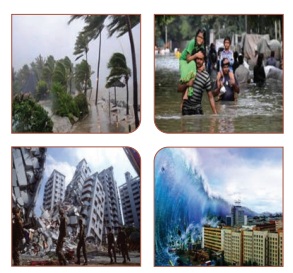
A. Discuss in pairs for two minutes on any one of these natural disasters. You may use the following points
* Causes
* Damages
* Precautions
B. Fill the word web with words related to natural disasters. One example is done for you.
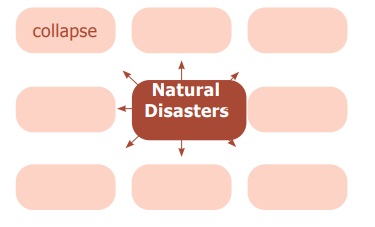

C. Imagine a situation where your house is surrounded by water and answer the following.
i. What health hazards are caused when water stagnates around your place?
ii. When there is a power shutdown for long hours during floods, what will you do?
iii. What precautions would you take if there is an announcement about flooding in your area?
D. List out the human activities which have an impact on nature. Complete the tabular column. One is done for you.
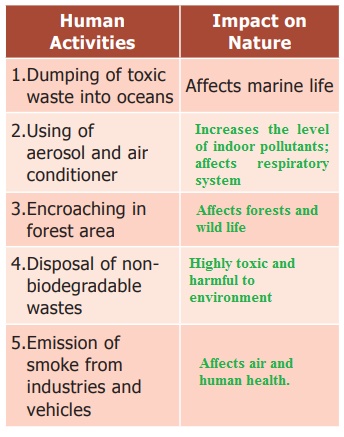
Discuss with your partner and answer the following questions
1. What were the girls doing in the living room?
The girls were sitting and knitting in the living room. Betty was looking at pictures in a magazine.
2. Why was mother not able to come home?
Amy’s mother took Dick to the dentist’s and was going to Mrs. Brant house for a recipe. So she was not able to come home.
3. How did Jim want the girls to ‘get organised’?
He asked Betty to look up her flashlight, candles, lamps, lanterns. He asked Rose to fill the tubs and pails. Amy must check on food, blankets and coats. He asked them to get the first aid box.
4. Which two important things did Jim want the girls to do to avoid getting scared?
Jim wanted the girls not to let others know how scared they were. He wanted all necessary things like food, water, blankets, coats and lights to be brought.
5. Where did Jim want the girls to climb up? How was it going to help them?
Jim wanted the girls to climb into the attic and into the roof. It will help them staying away from the flood before it reached them.
6. Who went to get Sara? Where was she?
Jim went to get Sara. She was in the playhouse porch.
Discuss with your partner and answer the following questions.
1. What were the important objects that the girls and Jim try to move to the attic? Why?
The important objects like food, water, father’s books and mothers jewel case were moved to the attic. Because the water was rising.
2. Who came to rescue the children?
Tom, Peters and Miss. Marsh from the Red cross came to rescue the children.
3. What happened to Sara?
She had fallen down from the step ladder and hurt her right leg just below the knee.
4. Who is Miss Marsh? How does she help Sara?
Miss. Marsh is a nurse from the Red cross. She tried to fix Sara’s right leg which was badly hurt. She consoled Sara. She decided to carry her safely in the boat with the help of pillows and umbrella.
5. Who were taken in the boat? Who were left behind?
Sara, Rose, Betty were taken in the boat. Jim and Amy were left behind.
6. How does Red Cross help the children?
They help the children by taking them in the boat with all the needs like food, lantern and the rescue team.
Glossary
stamping (v) : bringing down (one’s foot) heavily on the ground
cloudburst (n) : a sudden violent rainstorm
pitcher (n) : a large jug
lantern (n) : a lamp with a transparent case protecting the flame or electric bulb, and typically with a handle by which it may be carried or hung
gasp (v) : catch one’s breath with an open mouth, owing to pain or astonishment
shudder (v) : shiver typically as a result of fear or revulsion
hark (v) : listen, pay attention
thumping (v) : hitting or striking heavily, especially with fist or a blunt instrument
pickaback (n) : a piggyback ride, on the back and shoulders of another person
wink (v) : close and open one eye quickly, shine or flash intermittently
splint (n) : a long flat object used as a support for a broken bone so that the bone stays in a particular position while it heals
A. Based on your understanding of the play , choose the correct answer and fill in the blanks.
1. The radio announced that the river was above the flood stage.
a. the river was above the flood stage.
b. the Burnet Dam had given way.
c. there will be a cloud burst.
d. there will be a cyclone.
2. Mother couldn’t get home from Mrs. Brant’s because the bridges between home and the town were under water.
a. it was raining heavily.
b. the bridges between home and the town were under water.
c. there was an emergency at Mrs. Brant’s house.
d. she had broken her leg.
3. The Burnett Dam gave away as it rained heavily and the snow was melting.
a. it rained for days.
b. the dam was weak.
c. it rained heavily and the snow was melting.
d. the maintenance was poor.
4. There was no power because the power house was out of commission.
a. the power house was out of commission.
b. the power house was flooded.
c. the dam gave away.
d. there was fire.
5. Why did they splint up Sara’s leg with pillows?
a. She was unconscious out of fear.
b. She had broken her leg below the knee.
c. She was too lazy to walk.
d. She was making a fuss.
B. Based on your reading, answer the following in two or three sentences each.
1. Why did Jim run from school?
It was a cloud burst. So Jim ran from school to get home.
2. Where was Amy’s mother?
Amy’s mother was at Mrs. Brant’s house.
3. Why did Amy ask Betty to fill in the water tubs?
Amy asked Betty to fill in the water tubs because the town supply may be cutoff.
4. According to Jim, what are the two things that a person should remember in times of emergency?
The first thing is one should not let the others see how scared one is. The second thing is one has to get water, food, blankets, coats and lights.
5. Why is Jim climbing on the roof?
Jim is climbing on the roof to signal for help from there.
6. Who were there in the living room? What were they doing?
Amy Betty and Rose were in the living room. Amy and Rose are knitting. Betty was looking at pictures in a magazine.
7. Why were they going to sleep in the attic?
They were going to sleep in the attic, because they wanted to escape from the flood.
8. Who came in the boat?
Mr. Peter and Miss. Marsh came in the boat.
9. Who is the founder of the Junior Red Cross?
Jean Henry Dunant is the founder of Junior Red Cross.
C. Match the following by drawing a line across column A and B.
1. Amy – to Chicago on business
2. Betty – dentist
3. Rose – flash light
4. Sara – nurse
5. Jim – blankets
6. Penny Marsh – Mrs. Brant’s
7. Mr. Peters – fractured leg
8. Mother – tubs and pails
9. Dick – Junior Red Cross
10. Dad – rescues the children
Answers:
1. Amy : Blankets
2. Betty : Flash light
3. Rose : Tubs and pails
4. Sara : Fractured leg
5. Jim : Junior Red cross
6. Penny Marsh : Nurse
7. Mr. Peters : Rescues the children
8. Mother : Mrs. Brant’s
9. Dick : Dentist
10. Dad : To Chicago on business
D. Based on your understanding of the text, answer the following in about three to four sentences each.
1. Describe the ‘home alone’ experience of the children.
Children comforted each other. They gathered all the necessary things. They were ready to overcome the disaster.
2. Elaborate the rescue operation undertaken by Mr. Peter.
Mr. Peter came in a boat with Miss. Marsh. They rescued the children. He gave first aid for Sara and took her to Red Cross Hospital.
3. How did Jim prove himself as a good rescuer in the flood situation?
Jim proved to be the man of the mission. He updated all the news about flood. He made the children to collect food, water, blanket, coats and lights. He rescued Sara from the playhouse porch. Thus Jim proved himself as a good rescuer in the flood situation.
4. Briefly narrate the happenings of the play in Scene II.
a. How did Amy manage the situation at home?
Amy joined hands with Jim to carry out all precautions to protect the children. She was more responsible to collect fresh water to drink for some more days. She looked into the basic needs of food and shelter. She engaged Betty and Rose to complete the task. She was very helpful to Sara also. She had the concern for her mother who could not return home. Thus she managed the situation very well.
b. How did the Marshall save the children?
The children were panic stricken after the flood. Mr. Peter and Miss. Marsh, the Red cross nurse, had brought the boat. They gave first aid to Sara. They took her to the Red cross hospital. Betty and Rose were also taken with them in the boat. Amy and Jim stayed behind. Thus the Marshall saved the children.
COMMON PARAGRAPH
PARAGRAPH FOR TOPPERS:
Synopsis:
• Introduction
• Old man river
• Jim took charge
• Help from the Red cross
• Mission Rescue
• Conclusion
Introduction:
Tragedy strikes unexpectedly. This lesson focusses on the awareness of first aid. The author denotes the significant role played by Red Cross
Old man river:
One late afternoon in March it was a rainy day. The rains were very heavy. Amy, Betty were at home. Rose, their neighbour was with them. Amy’s mother took Dick to the dentist. Amy and Rose were knitting. Betty was looking at pictures in a magazine. The old man river was in floods. Flood water surrounded the house.
Jim took charge:
Jim their neighbour arrived to help them. The children were afraid. Jim assured them not to panic. He took control of the situation. He asked the children to get organised. Betty collected flash lights, lanterns and candles. Jim checked the availability of food, blankets and coats. They got the first aid kit.
Help from the Red Cross:
The dam gave away. The house was cut off from the south side. The water was around the garage. Mr. Peter and Miss. Marsh are working for Red Cross. They came in the boat. They rescued the children.
Mission Rescue:
Mr. Peter asked Jim and Amy to stay back. He offered them an extra lantern apd a jar of coffee. They rescued Sara who had fallen from the step ladder and broken her leg. Rose, Betty and Sara were taken in a boat. They admitted Sara in Red Cross Hospital.
Conclusion:
Amy and Jim thanked the Red Cross for the timely rescue operation. The lesson “Old man River” pictures life in times of crisis.
PARAGRAPH FOR AVERAGE
One late afternoon in March it was a rainy day. The rains were very heavy. Amy, Betty were at home. Rose, their neighbour was with them. Amy and Rose were knitting. Betty was looking at pictures in a magazine. The old man river was in floods. Flood water surrounded the house. Jim their neighbour arrived to help them. He assured them not to panic. He asked the children to get organised. They got the necessary things and first aid kid. Mr. Peter and Miss. Marsh who were working for Red cross came in the boat. They rescued the children. Rose, Betty and Sara were taken in a boat. They admitted Sara in Red Cross Hospital. They thanked the Red Cross for the rescue operation.
PARAGRAPH FOR LATE BLOOMERS:
• One afternoon in March it was a rainy day.
• Amy, Betty and Rose were at home.
• The old river was in floods.
• Flood water surrounded the house.
• Jim, the neighbour arrived to help them. He asked them to collect the necessary things.
• Mr. Peter, Miss. Marsh who worked for the Red cross came in the boat.
• They rescued the children. They admitted Sara in Red Cross Hospital.
• They thanked the Red Cross for the rescue operation
Think and answer
You are one of the survivors of an earthquake that has affected your city a lot. Share the trauma you underwent and what helped you to sail through it. Give a talk for two minutes.
Speech: THE EARTH QUAKE
I am here to speak to you about the earth quake which shook our area terribly. I have no words to express the disaster.
Everything was lost, The Richter scale was recorded 7.5. The earthquake struck the town at night on a day last year. Many big buildings collapsed one after the other. All who were asleep were in panic, Soon they got up, they ran out the open area. I too ran out of my house. I looked at my house and wept bitterly.
A month after the disaster it was found out that over 3000 people were killed and thousands of people were injured and hundreds of people homeless.
The fear lasted in my mind for a long time. I could hardly eat and sleep. I was a 14 years old student. I had to sit for my annual examination for class 9, Many volunteers helped me to prepare for my examinations. Both of my parents survived after the medical treatment for injuries, but we live in the camp still. I lost my home and my family has lost everything.
Even now any mild sound causes a big sound in my mind taking me back to the horrible deadly earth quake.
“Thank You one and all”
E. Using a dictionary, find out the synonyms and the antonyms of the words given below. One has been done for you.
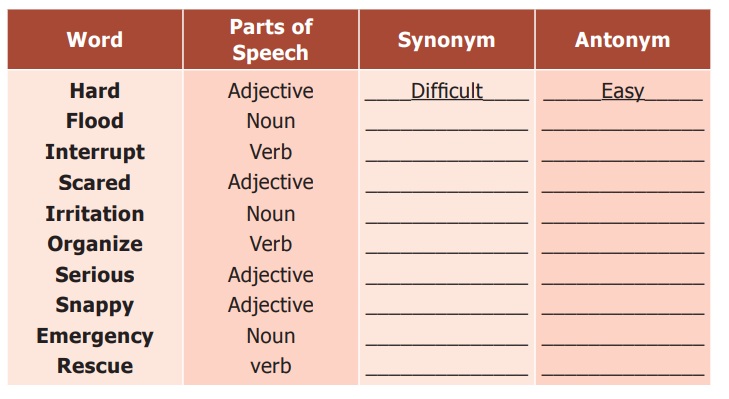
Solution:
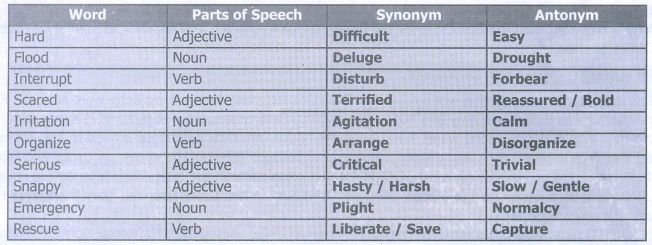
Listening
F. Listen to the paragraph and fill in the blanks.
The 2015 South Indian floods resulted from heavy rainfall generat-ed by the annual north east monsoon in November-December 2015. They affected the Coromandel Coast region of the South Indian states of Tamil Nadu and Andhra Pradesh, and the union territory of Puducherry, with Tamil Nadu and the city of Chennai particularly hard- hit. More than 500 people were killed and over 18 lakh people were displaced. With estimates of damages and losses ranging from nearly 200 billion rupees to over 1 trillion rupees, the floods were the costliest to have occurred in 2015, and were among the costliest natural disasters of the year. The flooding has been attributed to the2014-16 El-Nino event.
The 2015 South Indian floods resulted from heavy rainfall generated by the annual north east monsoon in November – December 2015. They affected the Coromandel region of the South Indian states of Tamil Nadu, and the Union Territory of Puducherry, with Tamil Nadu and the city of Chennai particularly hard-hit. More than 500 people were killed and over 18 lakh people were displaced. With estimates of damages and losses ranging from nearly 200 billion rupees to over 1 trillion rupees, the floods were the costliest to have occurred in 2015, and were among the costliest natural disasters of the year. The flooding has been attributed to the 2014-16 E1 – Nino event.
Writing
G. As a local government official working in the flood affected area you are talking to an old lady who has lost her belongings. Write a dialogue between you and the old woman. Complete the conversation.
You: Good morning Madam.
Old lady: Good morning.
You: I am from the Fire and Rescue department. How can I help you?
Old lady: Can you help me get my lost things?
You : I am here to help you. What have you lost, Mam?
Old Lady : I could not find out my ‘diamond’.
You : When did you miss it?
Old lady : I missed it only after the flood.
You : Where was it? When there was the flood?
Old Lady : It was only in my bed room.
You : Is it very dear to you?
Old Lady : It is very precious to me. I have no safety without it.
You : We shall find it out by checking your house completely.
Old Lady : Do it quickly before my diamond dies!
You : How can it die, Mam?
Old Lady : It’ll surely die because ‘diamond’ is my pet dog.
You : Oh my God ! I’m helpless. May God bless you, old lady.
Creative Writing
H. Write a letter to your friend about your experiences during the recent ‘Gaja’ cyclone.
123, Vivekananda street,
Kottaram, Kanyakumari.
July 16, 2017.
Dear Vinothini,
The Gaja cyclone hit my town Kanyakumari very severely. The nearest town Nagercoil was no exception. The report confirmed the great loss of lives and properties in the whole district of Kanyakumari. It was intensified on November 30, 2017.
There was a severe damage to a lot of houses, schools, hospitals, and other infrastructures in our area. The power line went off along with the stoppage of water supply. It took months to recover.
The schools and colleges were closed. The important examinations were also postponed. Many fishermen did not return home even.
We are recovering slowly but it remains still in our mind.
Yours lovingly,
Angela.
Address on the envelope
To Stamp
Miss Angela Edwin,
115, Brighton street,
Darling Nagar,
Tirunelveli – 627011.
I. Make a poster of any natural disaster, giving details about the devastation caused.
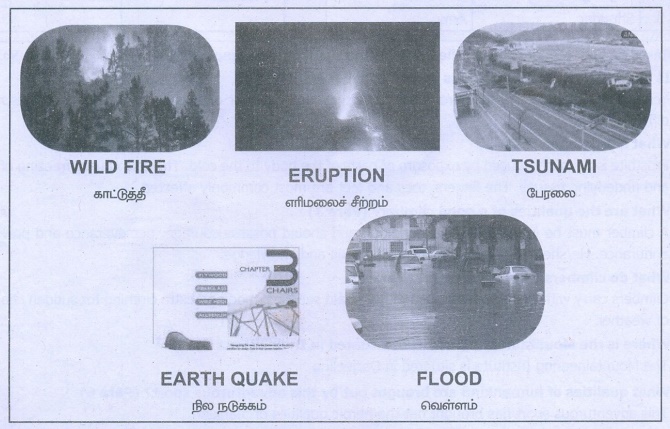
J. You are a volunteer in your locality to serve people who are affected by floods. How will you caution them to move to a safer place taking only their bare necessities? Describe.
1. Do not walk or drive across the flood waters.
2. Avoid recreational contact with flood waters and the risk of drowning.
3. Stay away from flood waters.
4. Do not go floating, boating, swimming or rowing in flood waters, streams or the river.
5. Use special caution to recognize in darkness
6. Stay away from power lines and electrical wires. Electrocution is also a major killer in floods. Electrical current can travel through water.
7. Collect medicines and three days supply of clothing with you.
8. Turn off electricity and gas cylinders and lock your doors and windows when you evacuate.
9. Collect the important documents, mementos, photos and pets to take them with you when you evacuate.
10. Raise belongings by placing them on tables, beds and benches or move them to higher ground.
K. Given below are some qualities that the characters in the play displayed during the floods for survival. Identify and write the character with the qualities.
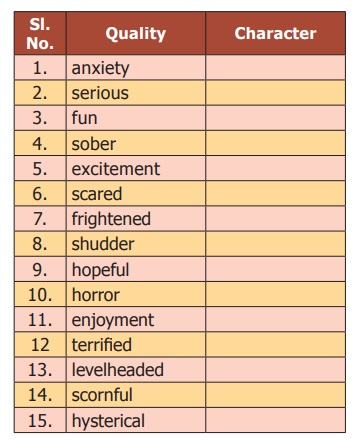
Answer:
Quality Character : Quality Character
1. Anxiety : Amy Marshall
2. Serious : Amy
3. Fun : Rose Field
4. Sober : Jim Hall
5. Excitement : Betty Marshall
6. Scared : Amy
7. Frightened : Sara Field
8. Shudder : Amy
9. Hopeful : Betty
10. Horror : Rose
11. Enjoyment : Sara
12. Terrified : Amy
13. Level headed : Jim Hall
14. Scornful : Jim Hall
15. Hysterical : Sara
Reading
You can use a variety of reading strategies to help you understand the text better. Your teacher will now explain how to ‘skim ‘and ‘scan’ a text for information.
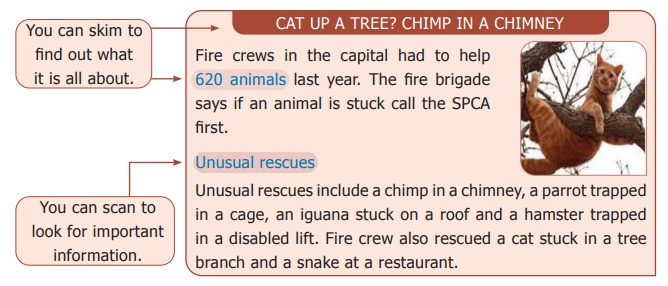
Read the following passage about mountaineering.
Scaling Heights
1. Mountains have a great fascination for men and people. Mountain climbing, however, is not without risks. It is a challenge to the unconquerable spirit of man and his love of adventure. That it is a dangerous sport cannot be denied. As one climbs higher and higher, breathing becomes more and more difficult. Some climbers, therefore, carry a heavy apparatus from which they inhale oxygen.
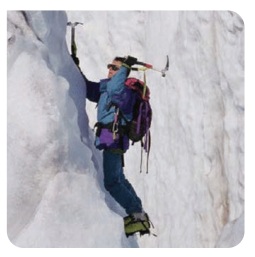
2. Mountain climbing is dangerous in the extreme. There are snow storms and blizzards. It is difficult to walk through the snow. It is still more difficult to climb on ice because it is difficult to keep foothold and cut steps with axes in order to make progress. The cold is so severe that the climber’s skin, feet, toes, fingers and tissues freeze, become numb and they may suffer frostbite. The most serious difficulty isthe climber at a high altitude gets exhausted with a little effort.
3. Mountain climbing requires proper training, skill and knowledge. The climbers must be well-equipped. They must be in good physical condition and should possess courage, perseverance and power of endurance. They should carry with them maps, compasses and other equipment so that they are able to find out where they are in the absence of any tracks. They must travel through dense woods as they approach a mountain and then climb steep rocks. Near the summit of a high peak, the climbers have to move over snow fields and glaciers. In dangerous areas they use ropes to tie themselves in groups.
4. The climbers carry with them packs loaded with first-aid supplies, food and extra clothing for sudden changes of weather. They display spirit of sportsmanship and fellow-feeling and face the severe risks of life undaunted. Mountain climbing is a common sport in Europe. There are mountaineering clubs where training in mountaineering is imparted.
5. There are high peaks in India and there have been successful expeditions to scale these highest peaks. After the conquest of the Everest by Tenzing and Hillary in 1953, the Mountaineering Institute at Darjeeling was established to develop interest in mountain-climbing among the Indians. Expeditions have been sent to climb the highest peaks in the country.
6. Mountain climbing is a thrilling adventure. It brings into play the heroic qualities of humankind. Mountaineers deserve all praise for their courage and heroism. In recent years Mt. Everest has been scaled several times by foreign climbers. India too has organised several expeditions to Everest. Lately an Indian Sherpa scaled the Everest without the use of oxygen. Mrs. Bachchendri Pal also succeeded in scaling the Everest. She is the first Indian woman to do it.
Do you know
A research team discovered in 1994 that Everest continues to grow approximately 4mm every year due to geological uplift.
L. Based on your reading, answer the following questions in a sentence or two.
1. Is mountaineering a dangerous sport? Why? (para 1)
Yes, mountaineering is a dangerous sport. As one climbs higher and higher, breathing becomes more difficult.
2. What is frostbite? (para 2)
Frostbite is an injury caused by exposure of parts of the body to the cold. The cold causes freezing of skin and underlying tissues. The fingers, toes and feet are most commonly affected.
3. What are the qualities of a good climber? (para 3)
A climber must be in good physical condition and should possess courage, perseverance and power of endurance. He/she must have proper training, skill and knowledge.
4. What do climbers carry with them? (para 4)
Climbers carry with them packs loaded with first-aid supplies, food and extra clothing for sudden changes of weather.
5. Where is the Mountaineering Institute situated in India? (para 5)
The Mountaineering Institute is situated in Darjeeling
6. What qualities of humankind are brought out by this adventurous sport? (para 6)
This adventurous sport has brought out the heroic qualities of mankind.
7. Why do mountaineers deserve praise? (para 6)
Mountaineers deserve praise because they possess courage and heroism.
8. What kind of visitors does Mt. Everest get? (para 6)
Mt. Everest gets visitors who scaled the Everest without the use of oxygen. Mrs. Bachchendri Pal is the Indian woman to do it.
Poster Making
Posters are a mixture of notices, advertisements, and invitations. They may be in the form of large hoardings to be put up on walls, or the size of handbills and charts to be displayed on notice boards. Hence, they have to be captivating, attractive and persuasive so as to influence a large number of people.
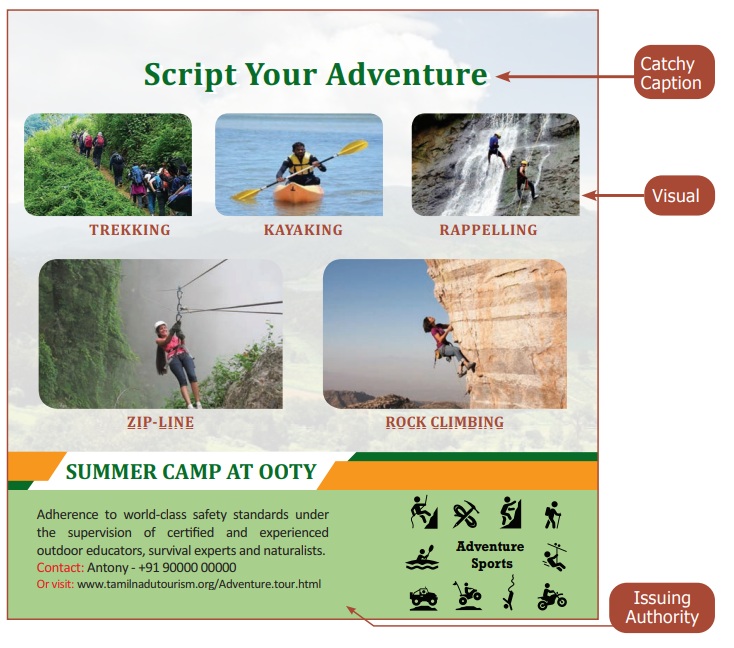
M. The Adventure Club of your school is organising an expedition to Kolli hills. Design an attractive poster for the same, giving relevant details. (The following table will help you design your poster.)

Answer:
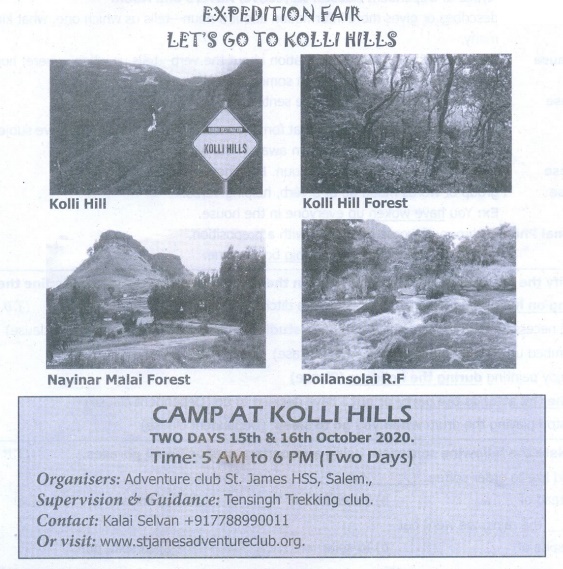
Grammar
Clauses
A clause is a group of words that contains both a subject and a predicate (or a verb). There are two types of clauses. They are independent clause and dependent clause.
Examples:
* Kalpana wants to buy a phone, but she does not have enough money.
(Independent Clause) (Independent Clause)
* If you don’t study well, you won’t pass the exam.
(Dependent Clause) (Independent Clause)
* Kavin bought a car which was too expensive.
(Independent Clause) (Dependent Clause)
* Sanjai is a talented player though he is out of form.
(Independent Clause) (Dependent Clause)
Independent Clauses also known as main clauses are complete sentences. They can stand alone and express a complete thought.
Examples:
I need a book.
Mary prefers coffee.
Ram is a good volleyball player.
Dependent Clauses also known as subordinate clauses contain a subject and a predicate, but they do not express a complete thought.
Examples:
When it is raining
Because you were late
After you go to school
There are three main types of Dependent clauses: Adjective, Adverb and Noun.
An Adjective Clause describes or gives more information about a noun—tells us which one, what kind, or how many.
Example: The book that I left on the bus belongs to Mr. Baskar.
An Adverb Clause describes or gives more information about the verb—tells us when, where, how, to what extent, or under what condition something is happening.
Example: She was happy because her father gave her a watch.
A Noun Clause takes the place of a noun in the sentence.
Example: This is the best route that I know.
Phrases
A Phrase is a group of words that forms a meaningful unit, but it is not a complete sentence. In other words, it does not have a subject or a verb.
* the black hat
* blown away
* in the wind
Example:
The red umbrella was blown away in the wind.
There are several kinds of phrases in the English language. Some of thecommon ones are described below.
Noun phrases
A Noun Phrase is a group of words made up of a noun and its modifiers.
* the white car
* my English teacher
* the book shop
Example:
The pink house is for sale.
Verb Phrases
Verb phrase is a group of words made up of a verb, helping verbs, and modifiers.
* ran quickly to catch
* filled with horror
* dedicated to
Example:
You have woken up everyone in the house
Prepositional Phrases
A Prepositional Phrase is a group of words that begin with a preposition and help to explain the relationship between two things.
* on the boat
* over the tree
* in the school
Example:
The present inside the big box is mine.
A. Identify the dependent clauses or phrases in the following sentences and underline them.
1. Texting on his phone, the man swerved into a ditch.
2. It isn’t necessary to cram all night if you have studied a little each day.
3. We climbed up the hill to enjoy the view.
4. I enjoy painting during my holidays.
5. Whether he attends the party or not, I have decided to go.
6. I will stop playing the drums when you go to sleep.
Answer:
1. Texting on his phone, the man swerved into a ditch.
2. It isn’t necessary to cram all night if you have studied a little each day. (Dependent clause)
3. We climbed up the hill to enjoy the view. (Phrase)
4. I enjoy painting during the holidays (Phrase)
5. Whether he attends the party or not, I have decided to go. (Dependent clause)
6. I will stop playing the drums when you go to sleep. (Dependent clause)
B. Complete the following sentences using appropriate prepositional phrases.
1. I would like to order coffee__________tea.
a) instead of
b) instead from
c) instead to
2. ____________ the rains, we went out.
a) In spite of
b) In spite
c) In spite on
3. ______ fire, break the glass to escape.
a) In case of
b) In case
c) In case with
4. I am standing here_______ my friends.
a) in behalf of
b) on behalf of
c) on behalf
5. We solved the problem _______ a new device developed by our engineers.
a) by means of
b) by means
c) by means to
6. ______ we are impressed with their performance.
a) In general
b) On general
c) In generally
Non-Finite Verbs
A non-finite verb (also known as a verbal) is the term used to describe a verb that does not indicate tense. The non-finite verbs are called gerunds, infinitives, and par-ticiples.
Finite verb
A verb that indicates tense and changes according to the subject
Non-Finite verb
A verb that does not indicate tense and does not change according to the subject
Finite verb:
Finite verbs change tense and number according to the subject.
Arun invited Suresh to his daughter’s birthday.
Her friends presented the girl with a toy.
His friend presented a watch.
Non-finite verbs have no subject and do not change according to the tense or number.
Non-finite verbs are broadly classified as follows:
i. Gerunds 1. Walking is a healthy habit (Present participle used as a noun)
ii. Infinitive 2. I like to walk early in the morning. (to infinitive)
iii. Present participle 3. These are my walking shoes. (Present participle used as an adjective)
iv. Past participle 4. Having walked a long distance I felt tired.
C. Look at the action words in bold. Identify whether they are either finite or non-finite verb.
They want to try a new approach. Answer: to try (Non-finite)
Trying is easy. Answer: Trying (Non-finite)
Having tried everything , he gave up. Answer: having tried (Non-finite)
All I can do is try. Answer: try (Non-finite)
If she tried, she would succeed. Answer: tried (Finite)
Infinitives and Gerunds
The infinitive is often called as ‘to verb’
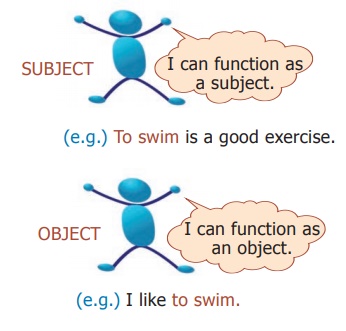
Infinitives may be used without to and we call such infinitives a plain infinitive or abare infinitive.
(e.g.)She made me do my project.
We use plain/bare infinitives with these modals.
shall, will, do, did, would, make, need,
may, might, could, must, let, dare, see
The infinitive may function as a subject, direct object, subject complement, adjective, or adverb in a sentence. Although an infinitive is easy to locate because of the to+verb form, deciding what function it has in a sentence depends on the meaning.
(e.g.) To wait seemed foolish when decisive action was required. (subject)
(e.g.) We intended to leave early. (direct object)
(e.g.) His ambition is to fly. (subject complement)
(e.g.) He lacked the strength to resist. (adjective)
(e.g.) We must study to learn. (adverb)
Gerunds
A gerund is an action word that ends in –ing and functions as a noun
D. Read the following pairs of sentences
Identify the subject.
* Travelling might satisfy your desire for new experiences.
* The study abroad program might satisfy your desire for new experiences.
Answer: Travelling
Identify the direct object.
* They do not appreciate my singing.
* They do not appreciate my assistance.
Answer: Singing
Identify the subject complement.
* My cat’s favourite activity is sleeping.
* My cat’s favourite food is salmon.
Answer: Sleeping
Identify the object of the preposition.
* The police arrested him for speeding.
* The police arrested him for criminal activity.
Answer: Speeding
Points to remember:
A Gerund phrase consists of a gerund plus modifier(s), object(s), and/or complement(s).
Dinesh and Divya have been assigned homework on non-finites. They are not sure when to use a gerund and when to use an infinitive.The decide to meet their teacher and get their doubts cleared. The teacher introduces them to Mr. Gerund and Ms. Infinitive.\
Play the conversation
E. You may role – play the conversation.
Teacher: This is Mr. Gerund. You may have seem him after these verbs ‘enjoy; ‘finish; ‘keep; ‘mind; ‘suggest; ‘forgive; ‘excuse; ‘postpone; go’
Gerund: I come after a preposition too.
Teacher: Mr. Gerund comes in handy to describe a real action.
Infinitive: Hello friends, I am Infinitive. Words such as ‘like’, ‘refuse’ are followed by me.
Dinesh: I know you. I take your help to describe a general or future action.
(I think I need to get up early tomorrow to complete my grammar exercise.)
Divya: You have helped me to express ‘reason’, ’intention’,’ purpose’.
(I wish to finish my assigment by tonight.)
Gerund :Do you know, after verbs like ‘begin’,’ love’,’ continue’, ‘try’, ‘learn’, ‘start’, ‘neglect’, you can use either of us?
Infinitive: But remember we mean different things when used after ‘stop’.
Dinesh: Divya,When we saw Rajesh at the mall, I stopped to talk to him.Why didn’t you wait?
Divya: Don’t you know I stopped talking to him?
Gerund: I am also used after these phrases –‘It’s no use ‘ , ‘It’s no good‘
Dinesh and Divya: Thank you , mam. Bye Mr.Gerund and Ms.Infinitive.
F. Now, work in pairs and help Dinesh and Divya complete the exercise given below.
Where are the astronauts headed to?

1. Write the gerund/infinitive form of the verbs in the blanks.
1. The astronauts managed to complete (complete) their training in record time.
2. They learned how to survive (survive) in space without gravity.
3. The best astronaut almost quit try (try) to learn the complex information.
4. Their mission appeared to be (be) in jeopardy.
5. Then Marina encouraged him by saying, “It’s no good to quit (quit) the project right at the end.”
6. Being an astronaut will enable you to achieve (achieve) great success in life.
7. If you give up studying (study) now, our mission will be scrubbed.
8. Think of your fellow astronauts who wouldn’t hesitate to help (help) you in time of trouble.
9. We astronauts must keep on Preparing (prepare) for our space launch.

10. Some say it’s no use travelling (travel) to distant planets, because it takes too long.
11. But we really want to visit (visit) other planets and find out if life exists on them.
12. Can you imagine walking (walk) up to a Martian and shaking hands and to say (say), “Hello, how are you? “

13. We really look forward to meet (meet) alien creatures and to find (find) out what they are really like.

14. Many scientists have warned us not to take (take) this dangerous journey, but we are not discouraged.
15. Travelling to far away planets involves risking (risk) our lives for the thrill of discovery.

16. However we won’t delay to blast (blast) off into space.
17. Would you like to accompany (accompany) us on our journey if you could?
18. During our training we have got used to being (be) weightless and living (live) under difficult conditions.

19. Scientists admit to to being (be) intensely curious about life on other planets.
20. I’m sure they would also enjoy travelling (travel) with our crew.
21. We told them to come (come) with us on our trip, but some of them think it is a waste of time searching (search) for life that doesn’t exist.

22. We have been taught how to endure (endure) hardships during our trai-ning and now we can’t afford to waste (waste) money.
We’re on our way!
Question: Which planet are the astronauts heading to first? Add the infinitives.
Neptune-10 Venus-09 Mars-18 Jupiter-11
Answer : The astronauts are heading first to Mars-18














